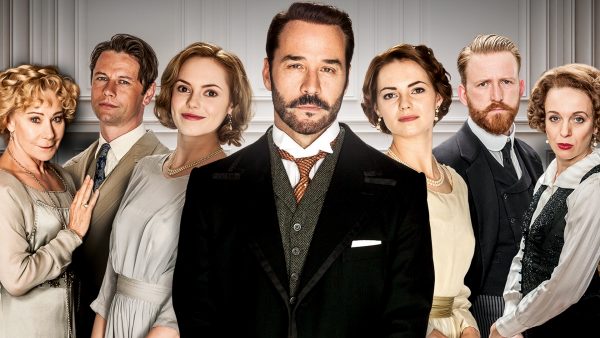I was looking forward to the third of season of ITV’s Mr. Selfridge since the ending of the second series. While the third season did not exactly disappoint me, I do think that there was a bit of room for improvement.
When the season begins, World War I has ended. Harry Selfridge’s daughter, Rosalie, is getting married, and a spectacular wedding and reception are being prepared. While Harry is still mourning the loss of his beloved wife, who died recently, his store and financial circumstances are in a very good state, and things are going well. However, Harry’s grief is causing his thinking to not be completely “on the ball”, and he is beginning to make decisions that will ultimately result in disastrous consequences.
Agnes, who is a very prominent character in series 1 and 2 of the show, is less significant in this series, and leaves the show relatively early in the season. In the first episode of series 3, Agnes’s fiancé, Henri, returns home from the war. However, what no one yet realizes is that he has been severely traumatized, and has what we would recognize today as PTSD. Agnes decides that she and Henri need to move away to France, to give him a chance to recover. This is when both these characters leave the series, to the disappointment of many fans. However, it could be argued that these characters really did not have any other avenues for further development, and so it was the right time for them to depart.
With Agnes’s departure, Harry Selfridge becomes the series’ only protagonist (as Agnes and Selfridge were formerly sort of “co-protagonists”). Appropriately, the series starts to focus more extensively on Harry and his life. We see the beginning of Harry’s descent into very bad decisions, and unfortunate circumstances conspiring against him.
Playing a large part in Harry Selfridge’s downfall is his deception by a woman going by the false name of “Nancy Webb”. Nancy convinces Harry to put a great deal of money into a charitable scheme, which turns out to be non-existent. She and her brother, Gus, are planning to steal the money for themselves, and run away to America for a new life. Still deeply grieving for his late wife, Harry is emotionally vulnerable, and he ends up falling in love with Nancy. Also instrumental in Harry’s fall is the malice of a man called Lord Loxley, who is relentlessly pursuing a personal vendetta against him.
I feel that the strongest features of Mr. Selfridge, series 3, are its acting, wardrobe, and accurate historical setting. Like the earlier Mr. Selfridge series 1 and 2, series 3 successfully draws you into a fascinating and rich historical world.
Overall, I found series 3 of Mr. Selfridge to be compelling and entertaining. While I do not think it was completely successful in fulfilling the expectations set up in the series 2 storylines, I do feel that it stands on its own as a successful series.

